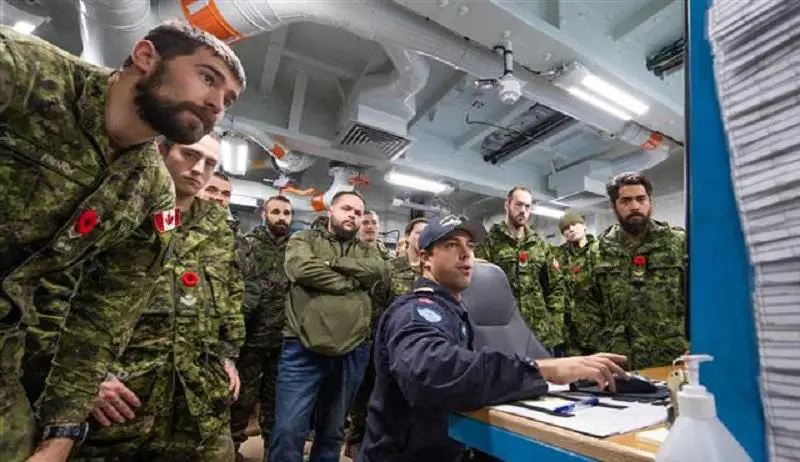Standing NATO Maritime Group 1 (SNMG1) is conducting training with Latvian armed forces and enhanced Forward Presence (eFP) battle groups in the Baltic Sea. The training began with a port visit in Riga, Latvia, Oct. 28-31 and continued at and from sea to increase understanding between the multinational joint forces. During the port visit, members from the Canadian-led eFP battlegroup invited crewmembers to witness a firepower demonstration at the Adazi Range in Latvia. In return, representatives from the battlegroup embarked SNMG1 ships to learn about maritime operations. SNMG1 staff provided soldiers with a maritime capability brief and information was exchanged to increase understanding between the naval and land forces.
In addition, Commander, SNMG1 Commodore Jeannette Morang met with Latvian Navy Commander Captain Navy Maris Polencs, Under Secretary of State Political Director Rolands Henins, and representatives from the office of the mayor of Riga fostering positive relationships with the Latvian civilian and military communities. Other activities included a force reception aboard HNoMS Esbern Snare, sporting events and an open pier event that allowed the Latvian public to get a closer look at the ships and visit the display of the eFP unit on the jetty, which demonstrated the cooperation between the multinational land and maritime forces.
On Oct. 31 SNMG1 conducted asymmetric warfare exercises with the Latvian Navy. The ships conducted small arms firing drills, while a Latvian patrol boat simulated an attacking unit. On Nov. 1 the Task Group conducted a Naval Fire Support exercise with Latvian Forces on the Skede Firing range. This exercise offered a good training opportunity for both Latvian Forces as well as SNMG1 units. The Latvian Firing range offered a unique and valuable opportunity for training, combining maritime and forces and enhancing communications for future operations. The Naval Fire Support exercise was an ultimate demonstration of maritime land integration.

“Establishing mutual understanding and interoperability between maritime and land forces is crucial for successful joint operations. I am very happy with this opportunity for the group to improve their knowledge of and bond with forces ashore,” Commander, SNMG1 Commodore Jeannette Morang said. “”
SNMG1 is deployed in the Baltic Sea in support of assurance measures regarding Alliance resolve and commitment to collective defence, and to enhance maritime security in the region. Routine port visits strengthen NATO’S relationship with Allies and help maintain a safe and secure maritime environment for all.Currently, SNMG1 comprises flagship Royal Netherlands Navy HNLMS Tromp (F803), Royal Norwegian Navy HNoMS Maud (A530), and Royal Danish Navy HDMS Esbern Snare (F342). After the port visit Royal Norwegian Navy HNoMS Roald Amundsen (F311) left the group after two months of deployment.
The Baltic Sea region is of great strategic importance to all bordering nations. Co-operation in the area is of particular interest for NATO, as six Allied and two Partner Nations border the Baltic Sea. NATO deploys maritime forces in the Baltic Sea in order to maintain a credible and capable defensive capability in accordance with treaty obligations. SNMG1 operates under NATO Allied Maritime Command (MARCOM). Headquartered in Northwood, United Kingdom, MARCOM is the central command of all NATO maritime forces and the MARCOM commander is the primary maritime adviser to the Alliance. Like its land and air counterparts (LANDCOM and AIRCOM), MARCOM reports directly to NATO’s Allied Command Operations (ACO), which is located in Mons, Belgium.















